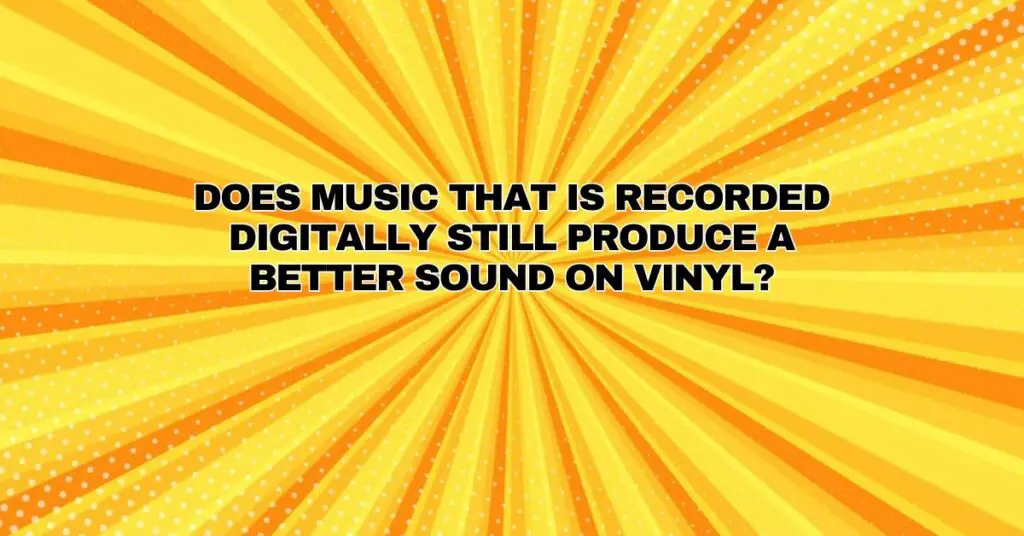The debate surrounding the sound quality of music recorded digitally and played on vinyl records has become a hot topic among audiophiles and music enthusiasts. Vinyl records, known for their warm and analog sound characteristics, often spark discussions about whether they can faithfully reproduce digitally recorded music. In this comprehensive article, we will explore the complexities of this debate and examine whether music recorded digitally still produces a better sound on vinyl.
Understanding the Analog vs. Digital Divide
To comprehend the nuances of this debate, it’s essential to understand the fundamental differences between analog and digital audio formats:
- Analog: Vinyl records are an analog audio format. Analog recordings capture continuous variations in sound waves, resulting in a natural and warm representation of music. Vinyl records are known for their unique sound signature, which includes inherent imperfections and surface noise that contribute to their charm.
- Digital: Digital audio, on the other hand, involves converting analog sound into discrete digital data, which is then stored and processed as binary code. Digital formats aim for precision and accuracy in reproducing sound, offering clarity and consistency but sometimes lacking the subtle nuances of analog audio.
The Vinyl Resurgence and Digital Recording
In recent years, vinyl records have experienced a resurgence in popularity, leading to an increase in vinyl releases of music recorded digitally. Many contemporary albums, including those recorded in professional studios, are now available on vinyl. This trend raises the question of whether vinyl can faithfully capture the essence of digitally recorded music.
Factors Influencing Sound Quality on Vinyl:
- Mastering Process: The mastering process plays a crucial role in determining how digitally recorded music will sound on vinyl. Skilled mastering engineers take into account the vinyl medium’s limitations and unique characteristics, optimizing the audio for the format.
- Vinyl Pressing Quality: The quality of the vinyl pressing process affects sound quality. Well-pressed records with minimal surface noise and distortion contribute to a better listening experience.
- Vinyl Playback Equipment: The choice of turntable, tonearm, cartridge, and stylus significantly impacts how music is reproduced from vinyl. High-quality analog equipment can reveal the nuances of digital recordings, preserving their fidelity.
- Vinyl’s Analog Signature: Vinyl records introduce their analog signature to any music played on them. This analog warmth and character are appreciated by many audiophiles, adding a unique sonic quality that differs from digital formats.
- Listener Preferences: Ultimately, sound quality is subjective, and listener preferences vary. Some may prefer the precision and clarity of digital audio, while others cherish the warmth and character of vinyl records.
The Role of Mastering and Production
The success of digitally recorded music on vinyl often hinges on the mastering and production process. Skilled mastering engineers understand the unique qualities of vinyl and make necessary adjustments to ensure a faithful and enjoyable listening experience. Additionally, the choice of vinyl pressing plants and their commitment to quality control can significantly affect sound quality.
Conclusion
The question of whether music recorded digitally sounds better on vinyl is subjective and multifaceted. While vinyl records are celebrated for their analog warmth and unique sound signature, the outcome largely depends on various factors, including the mastering process, vinyl pressing quality, playback equipment, and listener preferences.
When expertly mastered and produced with care, digitally recorded music can translate well to vinyl, retaining its fidelity and even gaining a touch of analog character. The vinyl format’s resurgence has opened up opportunities for both vintage and contemporary music to be enjoyed in this unique medium.
Ultimately, whether you find music recorded digitally to sound better on vinyl comes down to your personal tastes and appreciation for the inherent qualities of each format. Vinyl records continue to thrive as a beloved way to experience music, offering a distinctive listening experience that complements the digital age’s convenience and precision.


